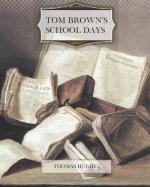Tom felt at once that his flank was turned, but he couldn’t give in. “He was at Winchester himself,” said he; “he knows all about it.”
“Yes; but does he think you use them? Do you think he approves of it?”
“You young villain!” said Tom, shaking his fist at Arthur, half vexed and half pleased, “I never think about it. Hang it! there, perhaps he don’t. Well, I suppose he don’t.”
Arthur saw that he had got his point; he knew his friend well, and was wise in silence as in speech. He only said, “I would sooner have the doctor’s good opinion of me as I really am than any man’s in the world.”
After another minute, Tom began again, “Look here, young un. How on earth am I to get time to play the matches this half if I give up cribs? We’re in the middle of that long crabbed chorus in the Agamemnon. I can only just make head or tail of it with the crib. Then there’s Pericles’s speech coming on in Thucydides, and ‘The Birds’ to get up for the examination, besides the Tacitus.” Tom groaned at the thought of his accumulated labours. “I say, young un, there’s only five weeks or so left to holidays. Mayn’t I go on as usual for this half? I’ll tell the Doctor about it some day, or you may.”
Arthur looked out of the window. The twilight had come on, and all was silent. He repeated in a low voice: “In this thing the Lord pardon thy servant, that when my master goeth into the house of Rimmon to worship there, and he leaneth on my hand, and I bow down myself in the house of Rimmon, when I bow down myself in the house of Rimmon, the Lord pardon thy servant in this thing.”
Not a word more was said on the subject, and the boys were again silent—one of those blessed, short silences in which the resolves which colour a life are so often taken.
Tom was the first to break it. “You’ve been very ill indeed, haven’t you, Geordie?” said he, with a mixture of awe and curiosity, feeling as if his friend had been in some strange place or scene, of which he could form no idea, and full of the memory of his own thoughts during the last week.
“Yes, very. I’m sure the Doctor thought I was going to die. He gave me the Sacrament last Sunday, and you can’t think what he is when one is ill. He said such brave, and tender, and gentle things to me, I felt quite light and strong after it, and never had any more fear. My mother brought our old medical man, who attended me when I was a poor sickly child. He said my constitution was quite changed, and that I’m fit for anything now. If it hadn’t, I couldn’t have stood three days of this illness. That’s all thanks to you, and the games you’ve made me fond of.”
“More thanks to old Martin,” said Tom; “he’s been your real friend.”
“Nonsense, Tom; he never could have done for me what you have.”
“Well, I don’t know; I did little enough. Did they tell you—you won’t mind hearing it now, I know—that poor Thompson died last week? The other three boys are getting quite round, like you.”




